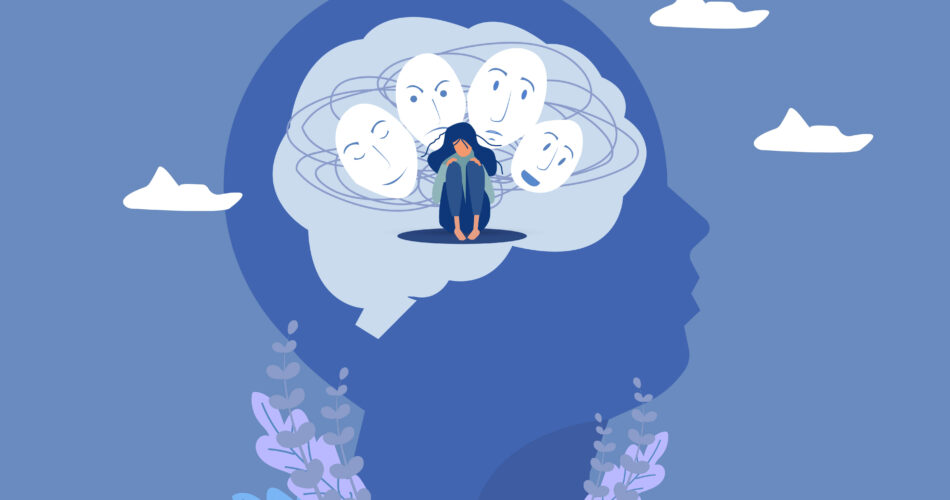When it comes to mental conditions, there are two types that often occur together, forming a complex and interconnected relationship. These conditions are depression and anxiety. Understanding the nature of both illnesses and their common relations help patients to seek appropriate help. Unfortunately, with the lack of knowledge about them, patients tend to disregard the warning signs, leading to progression of illnesses.
It is a bad cycle that needs to end as mental health is also an important aspect of the human body system. In today’s blog, we’ll discuss the main difference between the 2, and how both can be debilitating to a patient’s overall well being. Let’s begin!
Understanding Depression and Anxiety

Depression and anxiety are both mental health disorders that can significantly impact an individual’s well-being. It is important to recognize the differences between these conditions, as well as their shared characteristics. With millions of people of all ages experiencing these conditions, it is not surprising for them to misunderstand the coexisting influence of both illnesses to a person’s mental health.
When it comes to depression, it is a mood disorder that goes beyond occasional feelings of sadness or grief. It is characterized by persistent feelings of sadness, hopelessness, and a lack of interest or pleasure in activities that were once enjoyable. Depression can affect various aspects of a person’s life, including their relationships, work or school performance, and overall quality of life.
On the other hand, anxiety is a condition characterized by excessive worry, nervousness, and fear. It is a normal human emotion that becomes problematic when it becomes excessive and interferes with daily life. Anxiety disorders are more than just feeling anxious occasionally; they involve persistent and intense anxiety that can be debilitating.
People with these conditions often experience fatigue and lack of energy, which are both common symptoms of depression and anxiety. Not only that, as these conditions can also affect the cognitive functioning of a person. In most cases, they often have difficulty concentrating, making decisions, and remembering things. Furthermore, their drive or motivation to be productive can also be affected.
It is important to note that depression and anxiety are treatable conditions. Various treatment options, such as therapy and medication, can help individuals manage their symptoms and improve their overall well-being. Seeking professional help is essential for an accurate diagnosis and appropriate treatment plan.
The Interplay Between Depression and Anxiety
Understanding the interplay between depression and anxiety is crucial for effective treatment and management of these mental health conditions. By exploring how depression can lead to anxiety and how anxiety can lead to depression, we can gain insights into the intricate dynamics at play.

How Depression Can Lead to Anxiety
Individuals with depression may develop anxiety as a result of their depressive symptoms. The constant feelings of sadness and hopelessness can trigger worry and fear about the future. The mind, clouded by the weight of depression, becomes consumed with negative thoughts, leading to a heightened state of anxiety.
Moreover, the lack of interest in previously enjoyable activities can lead to social withdrawal, further fueling anxiety. When individuals isolate themselves from social interactions, they may experience a sense of loneliness and a fear of being judged or rejected. These feelings can intensify anxiety symptoms, making it challenging to break free from the cycle of depression and anxiety.
How Anxiety Can Lead to Depression
Anxiety, if left untreated, can contribute to the development of depression. The constant worry and fear associated with anxiety can be emotionally draining, gradually eroding an individual’s mental well-being. The relentless cycle of anxious thoughts and physical symptoms can wear down one’s resilience, leading to feelings of sadness, helplessness, and a loss of motivation.
Over time, these symptoms can evolve into a major depression such as clinical depression. The persistent state of anxiety can exhaust the mind and body, making it difficult to find joy in everyday life. The constant anticipation of potential threats and the overwhelming burden of anxiety can gradually chip away at an individual’s mental health, paving the way for the onset of depressive symptoms.
Biological Factors in Depression and Anxiety
These complex mental health disorders can have a profound impact on an individual’s well-being. While there are various factors that contribute to the development of these conditions, genetics and the functioning of neurotransmitters are two key biological factors that play significant roles. Let’s discuss them below!

The Role of Genetics
Research has suggested that there is a genetic component to depression and anxiety. Individuals with a family history of depression or a history of an anxiety disorder can possibly develop both conditions as well. Genetic factors influence the way certain brain structures and chemicals function, making some people more prone to developing depression or anxiety.
When it comes to genetics, it’s important to understand that it’s not just a single gene that determines whether someone will develop depression or anxiety. Rather, it’s a complex interplay of multiple genes, each with its own influence. These genes can affect various aspects of brain function, including the regulation of mood, the processing of emotions, and the response to stress.
Furthermore, genetic factors can also interact with environmental factors to increase the risk of depression and anxiety. For instance, individuals with a genetic predisposition to these disorders may be more vulnerable to the negative effects of stressful life events, such as trauma, loss, or chronic stress.
The Impact of Neurotransmitters
Meanwhile, neurotransmitters are chemicals in the brain that play a crucial role in regulating mood, emotions, and overall mental well-being. Imbalances in these neurotransmitters have been linked to depression and anxiety.
Here are the 3 neurotransmitters and their role in the development of depression and anxiety:
- Serotonin: One of the key neurotransmitters involved in mood regulation. Low levels of serotonin have been associated with depressive symptoms, such as persistent sadness, loss of interest in activities, and changes in appetite and sleep patterns.
- Dopamine: Another neurotransmitter that plays a role in the brain’s reward and pleasure systems. Imbalances in dopamine levels have been associated with anhedonia, the inability to experience pleasure, which is a common symptom of depression.
- Norepinephrine: A neurotransmitter that is involved in the body’s stress response. High levels of norepinephrine can contribute to anxiety symptoms, such as restlessness, irritability, and a heightened sense of fear or danger.
It’s important to note that while imbalances in neurotransmitters are often observed in individuals with depression and anxiety, it’s not a simple cause-and-effect relationship. The exact mechanisms by which these imbalances contribute to the development of these disorders are still not fully understood and are the subject of ongoing research.
Psychological Factors in Depression and Anxiety
Various psychological factors can also contribute to the development and maintenance of depression and anxiety. Understanding these factors is crucial in order to effectively address and manage these conditions.

The Influence of Personality Traits
Personality traits play a significant role in the development of depression and anxiety. Certain traits can increase the likelihood of experiencing these conditions.
For instance, neuroticism is characterized by high levels of anxiety, self-doubt, and emotional instability. Individuals with neurotic tendencies may have a heightened sensitivity to stressors and may struggle to cope with life’s challenges.
Another personality trait that can lead to depression and anxiety is perfectionism. While it is often seen as a positive trait, it can also be a risk factor due to the constant need for perfection and fear of failure. Thus, create immense pressure and stress, leading to the development of these mental health disorders.
Meanwhile, rumination, which is the tendency to dwell on negative thoughts and experiences, is another personality trait that can contribute to depression and anxiety. The repetitive and obsessive nature of rumination can keep individuals trapped in a cycle of negative thinking, making it difficult to break free from these conditions.
Lastly, individuals who have low self-esteem or a negative self-image can lead to the 2 interconnected mental health conditions. Negative self-perception can result in feelings of worthlessness and hopelessness. For instance, individuals may experience the feeling of unwantedness whenever they undergo weight gain and other different things that can affect their ideal image.
The Effects of Stress and Trauma
Experiencing significant stress or trauma can have a profound impact on mental health. With the constant presence of these psychological factors, patients can be more prone to depression and anxiety. For instance, individuals can develop anxiety whenever the stress becomes too much for them to handle. Furthermore, stress can also result in depression as individuals might feel too overwhelmed by the situation.
Similarly, individuals who have experienced traumatic events, such as abuse or the loss of a loved one, may be more prone to depression and anxiety. Trauma can have long-lasting effects on mental health, often leading to symptoms such as flashbacks, nightmares, and intense anxiety. Most common effect of trauma and stress is post traumatic stress disorder or PTSD.
In some cases, people that experience severe trauma resort to substance abuse. Recreational drugs intake are their chosen outlet to relieve stress and leave traumatic experiences behind. Unfortunately, this method is not helpful as it can lead to other mental health conditions due to prolonged usage of drugs.
Treatment Options for Depression and Anxiety

Struggling with depression and anxiety can be a challenging journey for patients. When your mental health is deemed weak due to the different factors that can trigger their occurrence, patients must seek help promptly. Doing so can help health care experts determine the most suitable approach for your mental health condition.
Here are the possible treatment plan for disease control that your psychiatrist might offer:
Psychotherapy Approaches
One of the effective treatments is psychotherapy, also known as talk therapy. This treatment option is suitable to address mental triggers such as phobias, traumas, stress, and other factors that lead to the development of depression and anxiety.
Under this approach, one of the most common therapy processes introduced is cognitive behavioral therapy. CBT is often used to help individuals identify and challenge negative thoughts and behaviors that contribute to their symptoms. Other forms of therapy, such as interpersonal therapy, can also be beneficial. Furthermore, a support group is also an available choice for patients suffering from depression and anxiety. Being able to talk about the difficulties they encounter to people who can relate is a big step towards healing.
These approaches are beneficial for patients as coping from the multiple triggers can be difficult. However, with proper guidance from a health expert, mental healing can begin.
Medication and Natural Remedies
For individuals with more severe or persistent symptoms, medication may be prescribed to alleviate depression and anxiety. Antidepressants, such as selective serotonin reuptake inhibitors (SSRIs), are commonly used. However, it is essential to consult with a healthcare provider to determine the most appropriate medication and dosage.
In addition to medication, natural remedies like exercise, relaxation techniques, and dietary changes can help manage symptoms. These lifestyle changes can make a huge impact in your health as your body becomes stronger. Furthermore, the effect of exercise in the production of feel-good hormones like endorphins can boost mood and reduce depression and anxiety.
Better Sleep Habits
In connection to lifestyle changes, another effective remedy against depressed mood or anxiety attack is having a better sleeping schedule. One of the causes of stress is lack of sleep as it can increase irritation and affect the mood in the overall aspect. So, improvement in your sleeping habits can be beneficial.
Other Treatment Option
Ongoing triggers can also affect your state of mind. That’s why having a reliable support system throughout your mental healing is a must. Patients suffering from depression and anxiety are encouraged to seek help, especially on urgent matters to avoid major depressive episodes or outbursts that can be detrimental to their health. In some cases, patients that have a heavy burden can be in a fragile state, which can lead them to risky choices such as suicide. Thus, the importance of having a solid support system.
Furthermore, there are several local health care communities that can help anyone that needs help in terms of mental health conditions. There are crisis lifelines available for all patients if ever they need other forms of therapy sessions. This immediate form of intervention allows the patients to seek help, especially if they don’t have time to visit a psychiatrist for another therapy session.
Conclusion
Depression and anxiety are complex mental health conditions with a significant impact on individuals’ lives. While each disorder has its distinct characteristics, they often coexist, influencing and exacerbating each other’s effects. Understanding the relationship between these 2 conditions is crucial for effective management and treatment.
If you are in need of proper diagnosis and guidance when it comes to depression and anxiety, seeking psychiatrists in the Philippines can improve your mental state. Book an online consultation or visit your local health centers for a therapy session.
Depression & Anxiety Quiz
Test your understanding of mental health
Need Support?
Connect with mental health professionals who can help you navigate depression and anxiety.
Find a Specialist


